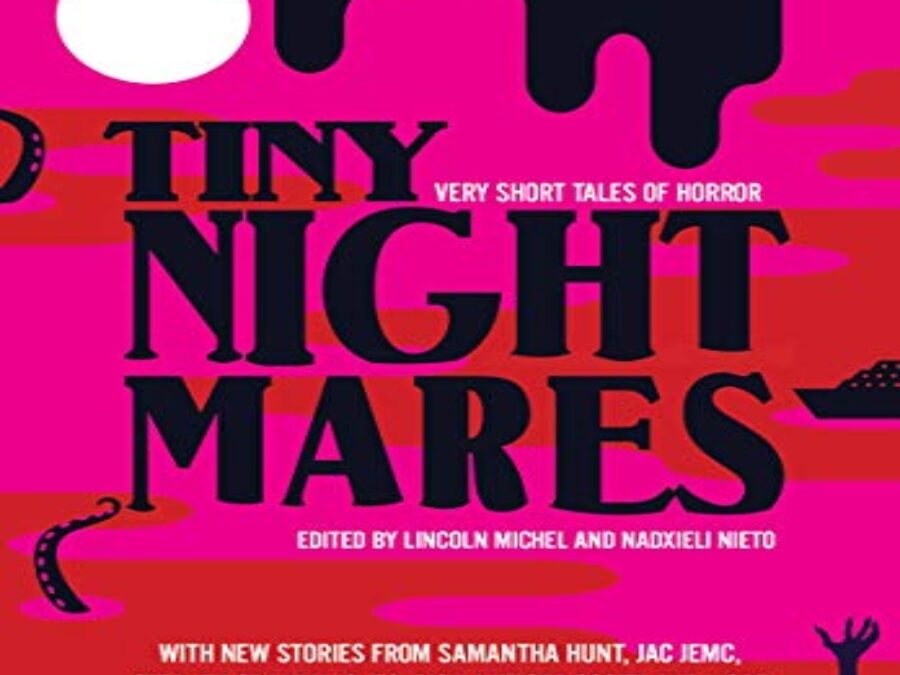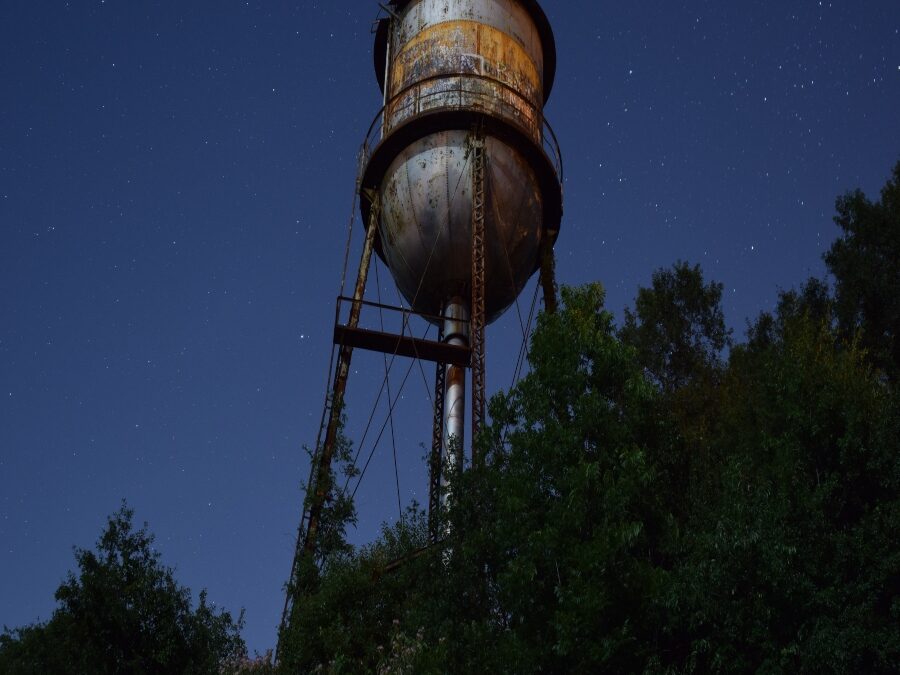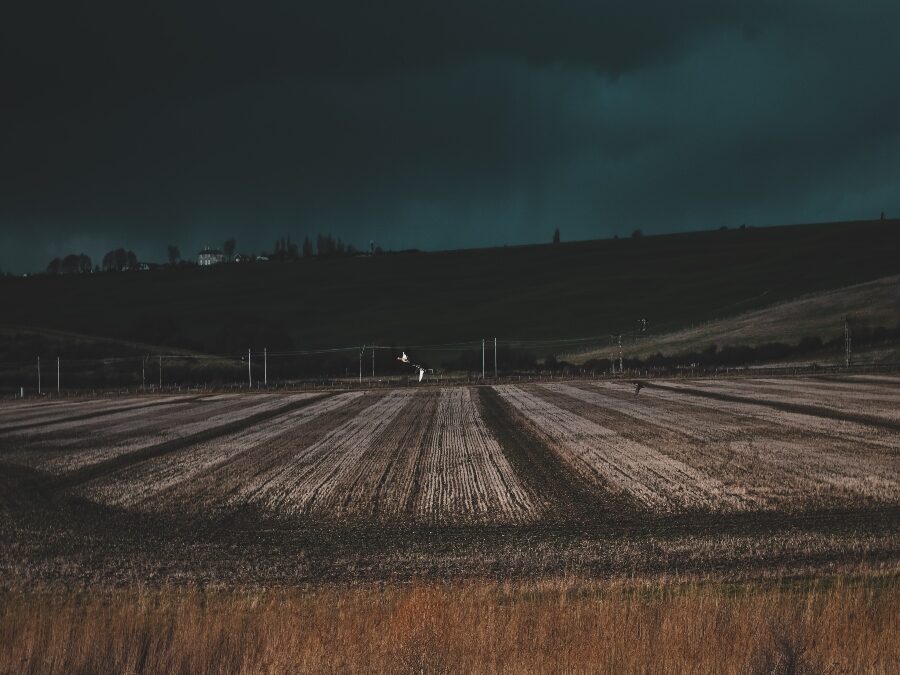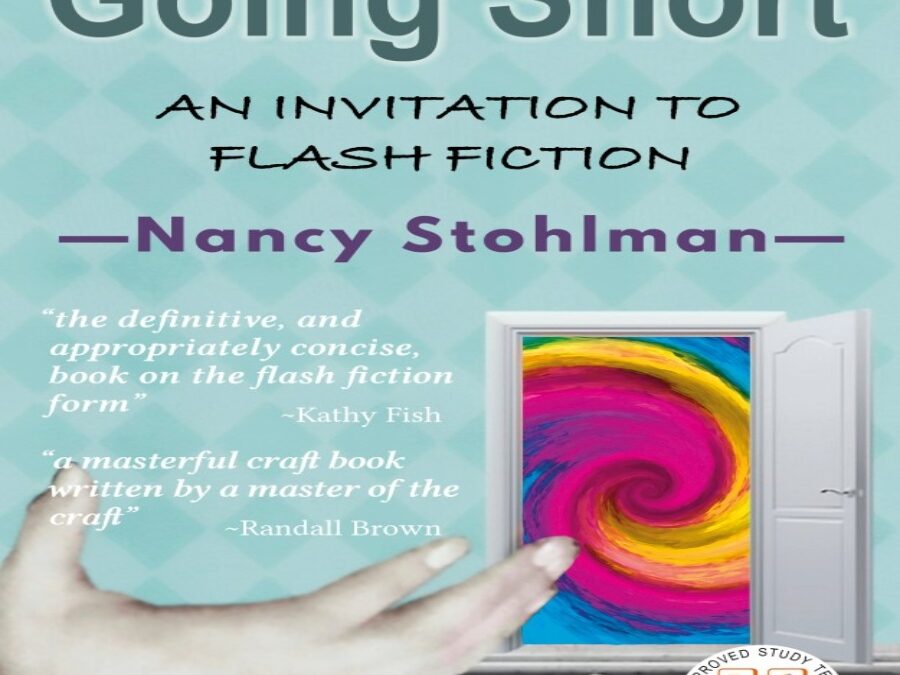
by Elisabeth Ingram Wallace | Nov 12, 2020 | contest winner, flash fiction
I had been snow-drifting through December, on slow trains and delayed buses, ending each day with a long icy walk past other bodies, also losing grip.
I could not get home that night, none of us could; Spaghetti Junction had filled with snow. We decided to camp at the office.
The heavy snow was unexpected. It had been mild that morning. Warm enough for icicles to ding from the roofs, impale children through their tiny soft skulls, kebabs of blood and hot chocolate. I hoped for such things then. I still do. To fill up the corners of my grey days with blood, circle them red.
I’d started Temping the August of my eighteenth birthday. I gifted myself the stationery cupboard, a bag full of paperclips and Post-It Notes. Theft, plus small chugs of Vodka made the hours chain together into long silver lines, of days and weeks, months I could pin-number from a wall.
Outside, that December day, the roads had vanished, the shops shuttered, my broken brain in a broken world, stranged by snow. Marshmallow cars, bollards of mountain lion and goat, skeletons of ice, snow folding its paws over doors, bunting roofs white.
We walked.
All the trains had stopped, all the buses gone.
All the wild was fleeing, Alaskan Geese crumping through the sky.
Flurries of snowmen, carrot noses pointing out the night. The fog of it, people melting, dropping into mist.
Tempting, to lay down next to a snow lion, sleep inside a zebra crossing, to freeze into spaghetti junction, go invisible in the snow. Be dug up in the future, bone-by-bone like a woolly-mammoth.
Instead, we went to find a pub. There’s always a pub.
The ‘Pig and Whistle’ was open. I ordered a pint.
Another.
Another.
We ate crisps, then we ordered burgers, chicken, steaks, fries, like we could digest the cold out of ourselves.
That was when Dan in Accounting arrived, late, brushing snow out his spikey hair.
“Jesus, it’s like a pack of ravenous wolves in here,” he smiled.
We stopped eating, talking, stared at him.
“I could hear you lot a mile off. You ladies. You’re so,” he paused and looked at Kayla’s plate, “hearty.”
Kayla had ordered a steak, and had been putting triangles of bloody meat in her mouth seconds earlier, corporate red lipstick wearing back to skin.
Kayla clanked her knife and fork down on the plate, smushed her napkin to a snowball on top.
“Fuck off Dan,” I said.
“Whoa. Whatever happened to being ladylike,” Dan said. He grinned.
The other guys sat on the edge of his conversation, some lighting up, some rolling eyes.
‘Chill out, it’s just banter,’ he said to me.
“Women always get called animals though, don’t they? Pigs, bitches,” I said.
“It’s nothing personal,’ Dan replied, ‘We just don’t want you getting too husky.”
I ate more Salt and Vinegar crisps and willed Dan to die.
I listened to the wild dogs outside, skidding over ice.
Kayla drank white wine till she laughed, a strange laugh with vines all over it, I laughed too, let myself go, to the howl in the wind, the footsteps in snow, spin speckles, flicks of flight.
If you listen well to the snow, you can hear the animals pirouette, the swish and whine of a canine triple Salchow.
The feral hounds circled the bins, breaking glass, looking for scraps to flesh their bones, ready for a fight.
It was dark on the walk back to the office, brick alleys snuffly with mutts snoring in doorways, puppies shivering in the curve of every snow angel. A bite in the squall; the whistle of a pig, a lion; a pack of bollard goats.
The world was getting deep, nippy, twisty about the ankles.
I cut through a crocodile of school children.
There were glaciers forming outside the municipal library.
Drunk, back in the office, everyone set up camps behind their desks – tent-forts, coats over chairs. They iglooed into snores.
While everyone slept, I stole stationary.
It helped. To have an infinite supply of white, empty notebooks, cheap biros to gouge a blue crack in the ice.
By dawn, the snow was melting, I’d written my application to University, an essay about the gender of sound, woman as animal, hungry, raw.
The thaw slushed everyone back into shushed phone-calls and blind busy nothing.
I went back to work too, as an Alaskan Malamute. A Siberian hound, husky. A strong storm-weather dog, with muscle, speed, endurance and claws. My paws would itch at night, soft pads splitting white into bone. My new goal was to pull in heavier loads.
Soon, I had three-hundred and twenty-two Bic-biros, sixty-one notebooks, seven mouse-mats, sixty-two highlighters and a large aloe-vera plant from the staff kitchen.
Twenty-two years on, as I look at the Oxford College library before of me, I see through the glass. It’s snowing. December, again.
I’m there too, in the window. Reflected. Decembering, remembering. I groom my wolf hairs, curl the whitening forward.
I push open the window, taste the sky, the Spaghetti Junction of it. Iced whorls of motorway, frosted white noise; the years I was trapped inside, how I stole my way out.
I look at the twelve girls sitting their entrance-exams today, seventeen-years old. I wonder who among them writes about Echo, or the howling dog-voiced Furies, deadly Sirens, babbling Kassandra, Iambe with her skirt around her neck, exposing open lips. Who will stop at this junction? Who will race, steal space, wear a blizzard for a face?
‘You have five minutes remaining,’ I say.
They grip their pens, and snarl.
One minute
Two
Three
Four
‘Put down your pens,’ I say, and none of them do, all of them keep writing, all of them have a sentence to finish, words running up mountains, clawed nibs digging down, all growl, somewhere in the wolf-thickets, scratching white nothing into howl.

by Cyn Nooney | Nov 9, 2020 | contest winner, flash fiction
That summer in Dallas my roommate Tina stole a Penthouse from her father’s stash. We wanted to see why Miss America surrendered her crown. Tina scoffed at the black and white photographs. Disgusting, she said. What sluts. I thought their bodies were tender and beautiful. Later, when Tina went to sleep, I turned the TV on low. Three women were dead in a bar on Southwest Loop 820. The newscaster said the rampage began after patrons declined to dance with a man who later returned with a gun. The Penthouse lay open on our floor. I could feel Vanessa Williams’ shame burn through the pages and into my skin.
In the morning Tina yelled about the cockroaches coming up from the drain. I was in my room, squirming into pantyhose, an empty L’eggs container cracked open on the bed. I can’t handle this, Tina carried on. Come kill them. Do it yourself, I yelled back. Quit being a baby.
We’d lived together in college, had finally landed jobs downtown. She had a K-car. I took the bus. Bananarama was playing on the radio: It’s a cruel, (cruel), cruel summer. We were both late for work. Rent overdue.
The front page of the newspaper showed some of the carnage from the shooting. The inside of Penthouse showed some of the vaginas. Other than my own I’d never seen one up close.
When I exited the bus, I could smell the exhaust on my blouse. The heels on my white pumps were scuffed. I rode the elevator to the nineteenth floor, where Oliver was in charge. He wore wrinkled suits with crimson ties, and when he passed the cubicles, he glanced upward. He was the only one with a private office. Had a bathroom too, and a middle-aged assistant named Jane who collected his dry cleaning and replenished the toilet paper. The rest of us assembled entertainment guides. My job was proofreading and I believed I was good at spotting errors.
Around ten-thirty I went out for a smoke and a fun-size Kit Kat. Two banker types were standing by the door. It was ninety-seven degrees, the sidewalk griddle-hot and just as greasy. I saw the taller guy bum a cigarette from the shorter one. Heard him say, Guess them Bettys should’ve danced.
Turning away, I tossed the Kit Kat, still in its wrapper, thinking about men and Vanessa and whether anybody would consider me pretty enough to pose in the nude. I’d wanted to bring Penthouse to work so I could look at it in the bathroom during lunch but Tina had seen me try to slide it in my briefcase.
What are you—a lesbo? she’d said.
I wasn’t sure. I had no one to ask. The only time I kissed a girl was back in fifth grade. I didn’t answer. Just stared at Tina and then at the floor.
Anyway, she said, give it here.
It’s wrong what they’re doing to her, I said. Making her give up the crown.
Tina crossed her arms and shook her head. She deserves it, for doing those things. Why are you so weird? Then she snatched the magazine. It’s going in the trash, she said, and so is this. She picked up the newspaper, muttering, So awful, so gross. All of it. You can thank me later.
She left the apartment and I pictured Vanessa and the women from Loop 820 lying in a heap.
Back at my cubicle, I dabbed my pits with Kleenex then sniffed to see how bad. Like a raccoon up the chimney. Oliver was approaching so I straightened up and said, Good morning. Sir.
There were only ten of us crammed in the small workspace but I knew he didn’t know my name. He didn’t acknowledge or return my greeting. I watched him walk toward his doorway and I heard him tell Jane to hold his calls. He needed a nap. He closed the door.
Oliver left shortly after five, followed quickly by Jane and the rest of the staff. I’d never been in his office but was suddenly seized with a strange urgency to do so—growing up I’d been forbidden to enter my father’s home study for reasons that had never been explained. I paused at the threshold then crossed Oliver’s room slowly, holding my breath. There was a large maple desk with a tobacco pipe on top and a burgundy leather chair with rolling wheels. I walked toward the window and looked down at the miniature people crossing the baked asphalt, rushing to bus stops and newsstands and markets. Take some dictation, I said aloud and laughed, turning dramatically from the window, addressing an imaginary assistant. I’ve got a lot to say. Let’s start with the Miss America Organization. After that, we’ll tackle Penthouse.
I laughed again, sadly. Always so much braver in my mind.
I picked up Oliver’s pipe and knocked it upside down on the desk. Took the gum from my mouth and stuck it on the edge of his chair. Rifled through a stack of manila files and mixed up some of the pages and took a few to hide in the bathroom and that’s when I saw her in the rack: Vanessa Williams—between sports columns and spreadsheets.
I’m taking you home, I said, and pressed her to my chest. Seconds later, I collided with Jane.
Oh! she shrieked—What are you doing here?
I dropped the magazine. The pages splayed open on the floor, revealing Vanessa yet again.
Well? said Jane.
What are you doing here? I said.
Never mind that. I could have you fired, you know.
I nodded. Inched my way toward the door.
Jane picked up the magazine and turned it over. I kept scooting away.
Wait, she said after a moment, extending her arm—I believe this is yours.

by Steven Simoncic | Nov 2, 2020 | contest winner, flash fiction
She will look tired. He will look bored. They will sit on the edge of their bed, close enough to indicate they are still married, far enough apart to indicate how it is going. They will have called you to their bedroom, which will be immediately weird. Your parents never do that, and you will assume you are fucked – in the kind of trouble you will not be able to talk your way out of, or tantrum your way through. Walking down the hallway, you’ll try to remember where you hid your Juul, wondering if they found the tiny vibrator Linea stole from her total bitch stepmom and gave to you — the one you’ve been too freaked out by to try, and put in your panty drawer, which is both stupid and obvious. You will be convinced they have found it, and that when you walk in, they will present it to you like a dirty, slutty, buzzing Christmas gift.
As you walk into their bedroom, you decide you will not speak first. You will have learned this from previous family meetings that started with you speaking and ended with you picking at dead skin on your thumb while they spoke.
“Reggie hit a nurse today,” your mom will say.
This will be a relief. No vaping, no vibrators, no you. This will also not be a surprise. Reggie spent thirty years at the Rough Steel Assembly plant working with guys who just got out of the military or jail. She swears more than other grandmas do, and smokes more than other grandmas do, and is more than capable of hitting someone, including your mom when she was your age.
But Reggie is also fun to watch Wheel of Fortune with. She’s raw-funny, brutally honest, and doesn’t get into your shit. And up until she went into the hospital, she was around, and oddly, became your best friend since you ate a bottle of Doxepin last Fall and people stopped sitting with you at lunch, because nobody likes a clinically depressed black girl.
“She’s hitting the nurses now… so…” Your mom will shake her head and wave her hand as she fills the silence with nervous energy. “A prognosis of terminal blah, that won’t get better even if the new drug blahs… Reggie wants to come home, but there’s no way she can blah for herself, and she can’t come here, because we can’t take care of someone who blahs in her own blah…” And then, finally, “Maggie, she needs to be in a home. She’ll listen to you.”
And in this moment, you will know.
You will know that Reggie is dying, and that your parents have already decided where she will die. You will know that there’s nothing you can do about it, just like last Fall, when they put you in a home, and there was nothing you could do about it. And you will know that even though you are being used; for one small moment, their fear makes you powerful. You will be fifteen years-old, overweight from antidepressants, slightly high in your parent’s bedroom – and for once — you will be in control. Not of the outcome, but of the process, and after the fourteen months of state-appointed therapy, you will understand that process matters. So you decide you will do this.
The hospital will smell like rubbing alcohol and gravy. You will stop at the lobby gift shop to buy one of the impossibly chipper mylar balloons that say things like You Did It! and Oh Yeah! When you get to the room, you’ll hear the sound of someone buying a vowel on the TV above Reggie’s bed. She will look small. Generic. No lipstick. Rare. Hair undone. Never. You walk to the side of the bed and tie the balloon to her wrist, the same way she used to do for you when you went to the zoo.
“You did it,” you will say, reading the balloon.
“What’d I do?”
“You hit a nurse.”
Not quite a laugh. But a smile. A tired little curl on the side of her mouth. The wheel spins. People cheer.
“How’s Linea’s –
“Haven’t tried it yet.”
She nods.
Her stomach is rock hard, distended from liver failure. She lays with her arms across her abdomen like a child with a tummy ache. She motions for you to come closer with a hand that is bloodied and bruised from weeks of IV’s. You lay alongside her on the hospital bed, your head nestled into her shoulder, the same way she laid with you when she called 911 and waited for the EMT’s to arrive. The wheel spins. People cheer.
“Reggie – I think, maybe –”
You feel her fragile arm squeeze against your body, and you stop. The things you had prepared to say, will go unsaid. You will not tell her it will be okay. And you will not tell her that she might even like it in the home. Because it probably won’t, and she probably won’t, and you respect her too much to pretend otherwise.
“I know why you’re here, Maggie,” she says in a low gravel. “And I’m still glad you came.” This time her eyes smile. She dozes off for a minute, and then, “I’ll go. Just don’t tell your parents I was so nice about it.” One last squeeze, and then she relaxes. You will feel the tension she has kept in her body for seventy-six years recede into resignation, if not peace. Your state-appointed therapist would say she has reached acceptance of her outcome.
Neither of you will move as the lunch tray is delivered. Laying together. In silence. Side by side.
Above her bed, the puzzle is solved. People cheer. The contestant hugs his ecstatic wife and perfect children. Behind them, in big block letters, on cubes of bright white light, are the words Here We Are.
“I’m glad you didn’t kill yourself, Maggie,” she whispers.
“Me too Reggie.”

by Alexander Lumans | Oct 30, 2020 | flash fiction
100. Someone has broken into the Global Seed Vault.
99. If you kill an ice bear, you have to tell the Governor.
98. If you do not, you will be subject to loopholes.
97. The Governor has an expensive Spanish carmine speedboat he takes for unlawful cruises in the fjord next to town.
96. If you see an ice bear, you do not have to tell the Governor, but you must offer an ice bear something.
95. A sack of kittens.
94. If you do not, he will kill you.
93. In The Future History of the Arctic, the writer predicts one hundred bad things will happen before the good thing.
92. It is a lot like William T. Vollmann’s The Rifles.
91. Except for the yellow king parts.
90. “Life is a process of trading many hopes for one memory.”
89. Today the sun’s out, blazing like a white eyehole in the cloud-masked sky. 88. Someone stole dandelion seeds from the Vault.
87. When the sun never sets, life feels like a very long road.
86. Nothing is too far from nothing.
85. If an ice bear sees you, it will wait until you see it.
84. The Future History of the Arctic is a book in the museum.
83. The museum is closed.
82. Sack of kittens arrive as special imports.
81. Why not shoot an ice bear when you see him on the long road called life? 80. Guns have been outlawed for seventy years.
79. The museum has some guns.
78. The Governor has one gun—a rifle—he is the Governor.
77. A largely contested loophole in the legal system.
76. The Future History of the Arctic will be written by me.
75. It addresses the gun law loophole.
74. If you kill an ice bear, and you are the Governor, you still have to tell the Governor. 73. Another loophole.
72. Someone stole plain bean seeds from the Vault.
71. There was once a yellow king, but he died.
70. The Future History of the Arctic says others will come.
69. “In this mirrorless house of mirrors.”
68. Someone’s building a fantastic garden.
67. Then: Cake Time!
66. The Future History of the Arctic says the difference between the Governor and me is what one is willing to do with a gun.
65. No loophole for this.
64. Someone stole pineapple seeds from the Vault.
63. If an ice bear sees your boottracks but not you, it must offer you something. 62. A sack, kittenless.
61. This vexes.
60. Ice bears search for loopholes.
59. Ice?
58. Some more ice?
57. A key to the museum?
56. This is a lie—no key exists.
55. Someone stole lychee seeds from the Vault.
54. “Sack of kittens for sale!” can be heard through the sun-blind town.
53. If the sun never sets, there is no such as a thing as a sunrise.
52. If you or I kill the Governor, you or I become the Governor.
51. If an ice bear kills the Governor, I could make a case that an ice bear becomes the Governor. 50. This is the case.
49. The museum opens for an hour, but no one realizes it.
48. The ice bear Governor outlaws all special imports.
47. The ice bear Governor outlaws all speedboats except his own.
46. The ice bear Governor keeps the gun law.
45. Someone stole elephant seeds from the Vault.
44. Public outcry: “We need more loopholes in the legal system!”
43. In The Future History of the Arctic, an ice bear becomes ice bear Governor. 42. You could look into The Future History of the Arctic and see what to do next about: 41. The ice bear Governor.
40. The sack of kittens market bottoming out.
39. The Vault break-in.
38. “A hundred kilometers away the yellow king’s grave cracks open like a seed pod.”
37. You cannot sell a sack of kittens for half a sack of kittens.
36. It’s so bright out.
35. The ice bear Governor takes lawful cruises in the expensive Spanish carmine speedboat. 34. He patrols for special imports.
33. Difficult to see the future.
32. No more sack of kittens imports.
31. Sack of kittens prices hit the moon.
30. “(How fine it is to have thoughts as empty as ice!)”
29. “(The yellow king’s thoughts are ice.)”
28. If you do not have a sack of kittens to give an ice bear, you must take an ice bear to the museum.
27. The museum is closed.
26. An ice bear will—sometimes—adopt a kitten.
25. A biological loophole.
24. With the Governor’s rifle, the ice bear Governor shoots the ice bear crossing sign. 23. We have the world’s only ice bear crossing sign.
22. Full of holes now.
21. Someone stole Japanese cherry blossom seeds from the Vault.
20. Someone is going to have to pay for all this.
19. “When his life is not completed, a man cannot die.”
18. In The Future History of the Arctic, we know what to do.
17. Un-outlaw imports.
16. Or pricecap sack of kittens.
15. Or more loopholes.
14. The ice bear Governor is banging on the museum’s doors.
13. Pay no attention to the bright sun; it blinds ninety-nine out of one hundred people. 12. Someone stole half-known seeds from the Vault.
11. The ice bear Governor wants to know what he’s going to do next.
10. I leave boottracks all over town.
9. I draw loopholes with my boottracks.
8. Sacks of kittens mewl throughout the endless daylit night.
7. The ice bear Governor sees my boottracks.
6. He cannot afford a sack, kittenless.
5. He offers me the rifle.
4. I shoot the ice bear Governor.
3. Now I’m the Governor.
2. I return all the stolen seeds—except pineapple—to the Vault.
1. I wait outside the museum with all the icy thoughts of a dead yellow king.

by K Chiucarello | Oct 28, 2020 | news
Flash is known for its tricks, the way it sneaks into our subconscious as an ‘easy’ task. Often when I’m reading through our queue I’ll come across cover letters from submitters who are just getting back into writing and think that flash is a natural way to start again, given how short the stories are. What they don’t know (yet) is that great flash reads so naturally because that writer has been condensing their stories for years, tightening and tightening into a concise tone, sharpening details until they cut deep, carving out arcs that take only a few hundred words to come down from. Flash packs the hardest punch around because of its containment and because of that we, as flash writers and readers, find ourselves consuming tens of hundreds of stories a year, all neat within different confines of genre. Given the turn of weather and the impending doom of the clocks lurching forward (and, one may dare to say, the horror of our political climate), Tiny Nightmares comes with good horror tidings, demolishing any neat genre bracket you hope to contain it in.
Released by Catapult and edited by Lincoln Michel and Nadxieli Nieto, Tiny Nightmares holds 44 delectable stories that worm their way into day to day horrors. Broken into four sections aptly named Heads, Hearts, Limbs, and Viscera, Tiny Nightmares pulls shorts from some of our favorite darling indie presses, reprints from Gigantic, Paper Darts, Electric Lit, and countless others. The anthology kicks off with “Guess” by Meg Elison. While at one point this story may have read as a preemptive tale of a fortune teller that has come into too much power, the story now reads as a foreshadowing bode to our pandemic, with a mass wave of unavoidable death trickling over the land. From there, the collection does not let up in the ways it takes horror and spins it into everyday occurrences. “Jane Death Theory #13” by Rion Amilcar Scott weaves footnotes, notating very real cases, into fiction to tell the story of coverups within the police force. “Instrument of the Ancestors” by Troy L. Wiggins examines the way generational and childhood traumas can haunt us until death. Theresa Hottel, in “The Wheat Woman”, takes us to rural America in an isolating story of a mother and daughter bound together by blurry violent thoughts.
Interspersed amongst the heavier stories of implied gore and grit are gems of humor. In Ben Loory’s “Pictures of Heaven”, Loory unravels at deadpan speed landing on two lines that leave the reader in a bloodied Heaven. “The Barrow Wight” by Josh Cook discovers frozen limbs discarded in the snowbanks. Cook leans into the absurdity and playfulness of horror when introducing readers to found limbs. “Then…(fuck it) the other foot dropped.” Cook quips. Hilary Leichter pulls us through a wildly dysmorphic world as humans turn into dogs, dogs into humans. The levity that Leichter achieves through prose twists all the more deadly once the end paragraph stops us in our tracks. The common thread that ties all of these stories together? The trademark universality of fear reigns supreme throughout. Tiny Nightmares understands how quiet descriptors can pile into towering monsters. The way the archive is ordered is no mistake. This collection systematically confuses and distorts the reader with each new reset in story. It mimics horror’s mutable form, packed with anxieties, ticks, laughter, violence. This small book is meant to be tucked inside of your coat pocket all winter long, ready to be passed around the evening’s bonfire. It is meant to travel campsite to campsite, with drops of warm whiskey straight from the flask. It is meant to sit bedside for the nights we are stranded inside with ice and hail hitting hard against windows. Perhaps it’s even meant to be taken to doctor’s appointments. It is there, in our mundane world, that this book does the heavy lifting, placing a finger on what we shield our eyes to each day. Within each other and ourselves the real horror awaits.
Purchase

by Exodus Oktavia Brownlow | Oct 26, 2020 | flash fiction
Honey, Mississippi 1949
When it gets cold in the south, mama wakes you up much earlier than she used to, and here you are now having to help clean the hog head sitting in the kitchen sink.
Its tongue is long, and black-beige-brown.
Its teeth are broken-glassed, and grey.
It’s grinning a terribly-split smile at you that makes you happy it’ll be in the stove soon.
Mama starts to look at you in that way. A kind of way that you’ve become accustomed to, now.
See, mama is much different with you since you’ve changed.
In the months before, she’d been like a freeze pop to you—all full of brightness and color, sugar and syrup. In the early morning, she is like a freeze pop once all of the good stuff has been sucked from out of it—all empty with dullness and pale, bite and bitter.
She’s become the tossed away bits that nobody ever finishes, or chews up on.
“You at that age, you know,” and the way that she says this is part-telling, part-threatening. “Come heah.”
You are already here, beside her, but she means closer so that she can see, so that she can do.
With her hog-juice hands, without washing them first, she touches you.
Moves to your breasts to see if they’ve gotten any fuller.
Reaches for your hips to feel for their roundness.
Presses her fingers to the lower parts of your belly to see if a hardness has started to grow.
Every time she does this, you have to keep your head facing her, still, if you carry a stankness in your face she’ll slap it right off you. If you cry, she’ll ask you what you cryin’ for?
In your head, you are screaming for her to stop touching up on you!
How, you ain’t been doing nothin’!
How, just because you’ve changed don’t mean you’ve been wantin’ to do somethin’!
When she is done, she replies to all that you’ve been shouting inside of yourself, washing her hands now that her inspection is complete.
“This ain’t never been your body, guh. Ain’t you know that?” She looks at you. “These,” she points to your breasts, “Are for them babies you gone have. Them,” she gestures to your hips, “Are for them babies to ride up on soon as they old enough to hold they own head, and that right there,” she points to the place below your belly, the place where you now bleed from. “That right there is for both them babies and ya’husband.”
“And both of em’ll use you all up. ‘Fillin’ you up with something that you don’t even want! That you ain’t even healed all the way up good enough to receive! One baby on one titty, and ya’husband on the other!”
And she is going on, and on now.
Not even talking to you, but talking to any and everything—the plates, the pans, the breakfast biscuits with plenty of butter.
You cannot move until she is finished with all her fussing, even though she will shout at you when she notes your respectful stillness to get to doing.
The hog head sits in a cast-iron skillet, gets slammed into the stove.
Blistery Popping-Pink Skinned.
Greasy Dahlia-Cut Grinned.

by Noa Covo | Oct 22, 2020 | micro
We feed the ghoul behind the elementary school crumbs of bread and throw sticks at it to make it dance. We watch its grotesque movements, our heads ducked down, squinting in fear, until our mothers call us for dinner, garbled words painting a language that skips down the street and rings in our ears. We cringe as foreign words sneak in, marring the pictures we have painted for ourselves on the walls of the elementary school, our language in big block letters, our parents’ language woven in the cracks of the pavement. Our mothers tell us to eat until there is nothing on our plates and we sneak what’s left into our pockets.
Our mothers ask us where we’ve been over dinner and we mumble names, our mothers shake their heads and tell us, don’t spend time with them. We know the rest of us are being told this as well. We know each of our mothers think all of the other mothers are crazy and we know that our mothers know we have discovered the ghoul and we gather crumbs of bread, of shaking hands, of voices whispered in the night, of letters that roll wrong on our parents’ tongues and we slip all of it into our pockets. We feed the ghoul and we eat what is left so that one day we will be big enough and strong enough to watch it dance without turning away.

by Jan Stinchcomb | Oct 19, 2020 | flash fiction
Goth Nanny
The baby sees black eyeliner circling dead eyes that teach skepticism, or something more sinister, a desire to detach from society. The buggy is covered in black satin. Goth Nanny likes to hang out by the cliffs, along the sharp stone edge, in view of the murderous sea. She communicates with the baby using a sign language of her own design, one heavy with menacing gestures. A smirk drags down the blood red corners of her mouth as she reads pavement-thick Ann Radcliffe novels. Later they will go to the graveyard, the only place where Goth Nanny smiles wide. In the meantime the baby sits up and shakes the nanny’s thermos of espresso, enjoying the sloshing sound it makes, and noticing (because this baby will be an audio engineer), the distinct difference between the crashing waves below and the secret splash inside the cold metal cylinder.
Ladybug Nanny
The baby lives with the awareness of impending flight. Early on this baby has learned that cuteness does not equal goodness. Fly away home, the nursery rhyme goes, introducing the baby to images of fire and missing children. Sometimes Ladybug Nanny arrives home in triumph, looking like a chubby red sportscar, carrying diapers and ice cream and Prosecco, but the baby is not fooled. This nanny was hired to stay, not leave, and there is no reason to praise her return. Fortunately the baby is an entrepreneur who uses everything life throws at her. “Fly Away Home” will launch the realty business that grows into a brokerage, then into a construction firm, and finally into a village of minimalist red buildings on stilts that address urban density while gently persuading people to fear flood over fire.
Spider Nanny
The baby is in love, just as the mother predicted, though the mother’s friends are horrified. Social workers are called in but disappear with a chilling consistency. Everyone admits that the spider silk layette is beautiful, and even the judgmental neighbor leaves her linens to be mended by Spider Nanny. How can you beat eight eyes?, the mother asks, determined to shame all those who dare criticize her. I hired a nanny who would help my girl for life, one who would show her how to handle men. The friends look around without speaking. Nobody knows who the baby’s father is. Nobody ever mentions him, not at birthdays, not even at the big graduation party, after the baby has completed her fancy fashion degree on a weaving scholarship.
Octopus Nanny
The baby never wants for anything. Each arm of Octopus Nanny holds something different: a bottle, a hammer, a plush heart toy, a thermometer, an astrolabe, a pacifier, a cell phone, a baby. They spend half the day at the city aquarium, the rest on the teal loveseat. The parents feel unneeded, unwanted. Sometimes, in the dark, they wince at the sensation of tentacles kissing their skin while strong arms anchor them to the bed, forcing their union. Often the mother wakes, screaming, then runs to the nursery, where the baby is neither drowning nor suffocating. He sleeps the sleep of babies while Octopus Nanny lurks in the temperate nursery aquarium. Does she ever sleep? The mother struggles with jealousy and resentment until the day she realizes, while listening to Jacques Cousteau, that the octopus had no choice but to become a nanny. Motherhood would have killed her. The mother races to the nursery to apologize and finds the baby playing with eight different piles of toys, turning effortlessly from one to another, never losing his place. Someone has been teaching him to multitask, preparing him for his life as a construction manager and single dad.
Punk Nanny
The baby likes to gum Punk Nanny’s stiff lavender mohawk. The baby takes a biscuit and dips it into the mug of milky tea that seems always to be cradled in Punk Nanny’s right hand. She hangs from the chains on his black leather jacket. Punk Nanny is patient. His clients always speak early, in polite sentences, though he himself says little. It’s all in his smile, his mother explains, when she drops by with carnation bouquets and strawberry tarts. He was born to be a nanny, like all the men of our family. Punk Nanny’s mother flicks her wrist so that her many diamonds catch the sunlight. She is about to leave for the airport. She and the baby’s mother shake hands, smiling and nodding, but something unpleasant hovers between them. Is it competition? Distrust? Perhaps it is merely the yearning to stay with one’s own child, which neither woman is able to do. The baby senses something is wrong, but instead of crying, she rises on two sturdy legs and walks for the pure joy of it, refusing to choose a career path.

by Shingai Kagunda | Oct 15, 2020 | flash fiction
Planting Season
“But what if?” Woman leaves the unfinished question hanging in the air, touching her swelling stomach. Man already knows what she is asking. “We will find a way to make it work. We always find a way.”
Heavy Rains Season
The baby smiles and she coos and they know she is one of them. There is a rumour that those born during the rains tend to carry that memory in them. The parents do not want to know but they know.
Harvest Season
“She said her first word at Kresh today.”
Man responds. “Hmmm, yes? What did she say?”
“Tomorrow”
A word that is banned. Man inhales sharply. “Where did she hear that? Woman?”
Woman’s gaze wanders on the ground. “We always knew, didn’t we? But we didn’t want to voice it.”
Man shakes his head furiously. “No, no, no. Someone must have said it within her hearing. The instructors?”
Woman throws her hands in the air. “Man listen, we knew there was a chance she would be… but… we took the chance anyway.
This is on us.”
Dry Season
It is decreed that the revolting word ‘yesterday’ shall also be removed from all speech. History only serves as a distraction. Anyone found speaking of anything other than today; other than now, deals with the full hand of the law.
Hunting Season (A lesson in silence.)
“And I must never…” Woman stops speaking, waiting for daughter to finish the chant they practice together on several occasions.
Daughter sighs. “…Say anything that was, or anything that could be; only everything that is.”
Woman touches hand to daughter’s chest.
Daughter fidgets impatiently. “Can I go now?”
Woman drags finger until it is settled on left breast, touching skin, feeling the little heartbeat drumming steadily underneath. “Hear me and hear me good. I say this once.”
She drums the little chest pacing it to daughter’s heartbeat.
“Tuh.Tuh.Tuh.
This is.” She draws out the words. “This is and I cannot imagi- think of a time where it will cease to be. Protect that it is at all costs. If you must speak…
“I know, I know.” Daughter responds quietly. “Only speak of now.”
Planting Season
Daughter is older now. Multilingual in the languages of imitation, amnesia, and silence. Daughter still hears voices. “Remember… Imagine… Yesterday… Tomorrow”. Daughter ignores voices.
There are screams sometimes. The hunted who speak in memory and imagination. There are rumours that there is a chamber where they are tortured, burned, little bits of their skin erased, over and over and over again.
Daughter will not be like them.
Stupid daughter.
Has never been like them.
No, get it right.
Is not like them, is not like them, is not like them.
Heavy Rains Season
Man is dead and woman cries. They say she cannot remember out loud but at night she dreams and daughter hears. Woman has had a lifetime of practice taming memory and possibility but the subconscious has a way of undoing all practice.
“I have loved you. I will love you.”
Harvest Season
And when it rains the voices get louder.
“I was your grandmother.”
“And I your great.”
“Do you let them forget me, child? As if I wasn’t part of the militia needed for this country’s freedom. Now the nation, independent, lets our memories rot. Treat our histories like the dirt on which you tread.”
“Hush sister you are overwhelming the girl.”
“There is someone you should hear girl.”
Man’s voice takes up the space left by the women. Softly at first. “Daughter?” a little louder.
“Hello?”
She does not respond, tries to ignore—thinks of woman breaking down— breaks down, it cannot be, it is not. It is not.
Dry Season
…
Hunting Season
And they say woman is going mad. She talks when she is awake as if she is asleep. They say it is that memory blood she carries, passed down by her mother. Tainted blood, a pity that it is showing up only now. They are watching her, watching her closely.
And whenever daughter is with woman, daughter whispers, “And I must never?”
And they finish it together, slowly, softly. “Say anything that was, or anything that could be; only everything that is.”

by Nancy Stohlman | Oct 14, 2020 | news
Flash Myth #1: Smaller Is Easier
Let’s debunk Myth #1.
Housed in the Chicago Institute of Art are the Thorne Miniature Rooms, tiny replicas of actual historic rooms painstakingly crafted on a scale of one inch: one foot. You press your face up to each of the 68 windows and gaze at the fully formed world inside— complete with exotic woods, fabrics, chandeliers and intricate, hand-woven rugs. The attention to detail in each room would be impressive even at life size, but the true fascination is the fact that they are just so damn tiny!
One of the reasons people love flash fiction is because, like the Thorne Rooms, there is something awe-inspiring about entering a perfectly formed tiny world. When done correctly, tiny is part of the art: the Mona Lisa on a grain of rice, a sculpture of Charlie Chaplin balanced on an eyelash. And it often requires more skill from the writer, not the other way around. Creating something tiny takes a different level of expertise and precision.
Sometimes when people discover flash fiction they assume: oh, it’s cute, it’s small, it’s easy. But to fully appreciate flash we must assume mastery: the story is small because the author has decided to tell it this way.
Flash Myth #2: Readers Have Short Attention Spans
This is probably the most common flash myth. But readers aren’t enamored with flash fiction because they have short attention spans—that’s like saying the sculptor of the bonsai tree didn’t have the attention for a full-grown tree, or that people who eat sliders don’t have the attention for a quarter-pound hamburger. Maybe, just maybe, they like sliders and bonsai trees?
In the same way, readers love flash fiction because it’s complex and breathtaking and accomplishes so much in such a tiny space.
In fact, flash fiction requires a more sophisticated reader. The story demands the reader to “pay close attention”—every sentence, every word takes on a new significance, if only for the limited number of them. The reader must jump the gaps, fill in the blanks, follow the breadcrumbs, and inhabit the purposeful spaces left by the writer. Which means that flash fiction is cultivating a new symbiosis between writer and readers, on and off the page.
As readers, we’ve gotten used to sitting in the audience and being entertained. But it’s nearly impossible to passively consume flash fiction. Leaving things unsaid and undigested requires effort and interpretation; the reader steps out of the role of voyeur and becomes an active participant in the story. It’s this act of interpretation that keeps art vital—no longer just watching from a darkened audience, flash fiction invites the reader up on the stage, hands them a tambourine, and tells them to keep up.
Flash Myth #3: Bigger Is Better
“Important” literary works are big. Therefore, some people still dismiss flash fiction as trivial. How could anything important be accomplished in such a small space? Flash fiction is good for barroom bets, not for serious literature.
The implication here is the more we have of something, the better it is. War and Peace is “important”: it’s long, it’s hard, it’s complex, it’s 1,200 pages. But Old Man and the Sea is only 120 pages and won the Nobel Prize for Literature. Should we assume that Tolstoy worked 10x harder than Hemingway or that his work is 10x more important?
The truth is they can’t really be compared. Flash fiction should be judged on its own terms. It’s meant to be digested in one sitting—it encourages speed, not languishing. Longer literature is meant to be enjoyed over time. But flash fiction doesn’t look for sweeping vistas. Flash fiction is not the epic saga. Flash fiction is that guy on the beach with the metal detector. We don’t need to know his history, we don’t need to know what he looks like. Just tell us what he finds.











Recent Comments